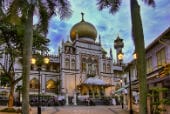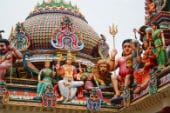Once known as the “Jewel of the British Empire”, Singapore is a thriving city-state on the tip of the Malay Peninsula. Evidence of its British colonial history can be found all over the city in its architecture and monuments. Although Singapore is a highly-developed city-state, the city has plenty of green spaces to counteract the urbanization of the island with almost ten percent of the land set aside for nature reserves and parks. Singapore has four official languages including Malay, Mandarin and Tamil. English is the language of instruction in the education system and is also the language of government.
Singapore is an easy place to get to with direct flights from hundreds of locations around the world, as well ferries from ports elsewhere in the region. You can even get there by car and train from Malaysia over the Johor–Singapore Causeway that connects the island with the mainland.
Many tourist attractions can be found in the city including Universal Studios Singapore and one of the world’s largest indoor aquariums all found in Resorts World on Sentosa Island. Other attractions include Singapore Zoo, Jurong Bird Park and Madame Tussauds.
Getting around the city and experiencing the many attractions on offer is easy with the many city tours and tourist passes available. If you want to escape the high-rises and enjoy more natural surroundings, you can rent bicycles at the local parks or head to the islands of Pulau Ubin and Kusu Island. Those looking for exciting dining have plenty of top-quality restaurants to choose from all over the city and shoppers can immerse themselves in the shops of the famous Orchard Road.
Register now & get certified to teach english abroad!The School
Our TESOL training center in Singapore is ideally located in the heart of the city, in the middle of the Central Business District with spectacular views of Marina Bay. In the area surrounding the school you will find shopping malls, restaurants, bars and much more. We are also close to an MRT station meaning that the rest of the city is only a short bus or train ride away. All the amenities you could need are conveniently located in the area around the training center. Our aim is not only to ensure that you are prepared to teach English at the end of the course but that you enjoy your time with us in Singapore.
In the building there are a number of classes taking place students are learning various languages and you get a great insight into the working life of a language instructor. Our course trainers are very experienced and dedicated to providing the best possible training for our course attendees; throughout the course they will be there to provide support and guidance as your learn the skills needed to become an effective EFL teacher. To help with your lesson planning there is a photocopier onsite and we have resource books available for use by course participants. Tea, coffee and water are available from reception free of charge while soft drinks and snacks can be bought at the mini-marts in the building or down the road.
Accommodation
We have different accommodation options available for our TESOL course participants in Singapore. These include condominiums, apartments and rooms in local hostels. Most options are located in the center of the city and are just a 15 to 25 minute commute from the training school. They have been checked to ensure that they provide all you will need for a comfortable stay.
Please feel free to let us know if you have any questions about the available accommodation and we will do our best to help you.
Course dates
 Coming soon...
Coming soon...Please check out our other course locations if you wish to attend a course before this one becomes available...
Course fees
The total price is divided into: deposit and balance.
The deposit may be paid via a) credit card b) Paypal c) wire transfer d) Western Union.
The balance of the course fee must be paid by cash, PayPal or bank transfer directly to the training center on the first day of the course.
US$ 600
US$ 1280
Accomodation Fees
The accommodation fees are not part of the course price and you are free to choose whichever accommodation option you prefer.
If you choose to use our accommodation, it should be paid for either by cash, PayPal or bank transfer directly to the school at the start of the course.
US$ 380







